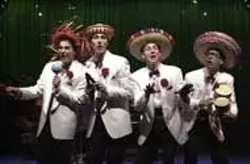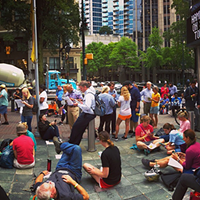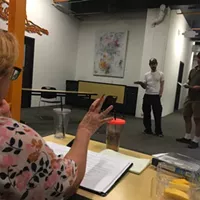But a ripple in the cosmos allows The Plaids one unfathomable chance to posthumously perform the breakthrough concert they never had a chance to perform in life. So the joke is on us.
Splendidly so in the current production at McGlohon Theatre, co-produced by the Pittsburgh City Lights Opera and our own NC Blumenthal Performing Arts Center. Previous versions we've seen here in Charlotte took this Stuart Ross concoction as a goofball homage to the clean-cut, chart-topping vocal quartets of the 50s: The Hi-Los, The Ames Brothers, The Four Aces, and The Crew-Cuts.
Trouble is, those very precious 50s — like The Plaids — never existed. As the song list of Forever Plaid makes abundantly clear, all of those male groups, and numerous others, didn't produce enough "Moments to Remember" to fill an entire evening. Not even one that plays for just under 90 minutes without intermission, leavened with plenty of patter and shtick.
To keep things rolling, Ross sent his Plaids foraging into wondrously incongruous frontiers. A Perry Como tribute is only the beginning. We get a Calypso medley, a madly condensed Ed Sullivan Show, and a brief Scottish fling. Because it's the plaid thing to do.
We go furthest astray historically with "Perfidia," a monster hit for Xavier Cugat way back in 1941. Most of the authentic 50s and early 60s hits are by solo artists. Besides Como, we hear smash hits by Johnnie Ray ("Cry"), Tennessee Ernie Ford ("Sixteen Tons"), Harry Belafonte ("Day-O," "Jamaica Farewell" and "Matilda") and Sam Cooke ("Chain Gang"), all retooled for the pallid Plaids.
An original Plaid in the first Off-Broadway production of 1990, director/choreographer Guy Stroman understands the delicate chemistry of the Plaids. Stroman decrees that this quartet shall be relentlessly earnest, adorably awkward, shockingly virginal and incurably white. And he's also presiding over a reinvention of the McGlohon as a cabaret venue, sending his ensemble out to mingle with the audience at their café tables, which have replaced most of the front orchestra section. For the first time in the Loaf Era, lighting designer Andrew David Ostrowski has the stained windows of Spirit Square flickering dramatically amid the cosmic ruckus that accompanies the Plaids' resurrection.
Cementing the entire production is an amiable cheesiness that is nearly irresistible. Fondly recalling their rehearsals in the basement of a plumbing supply company, The Plaids perform The Crew-Cuts' "Crazy 'Bout Ya Baby" with long-stemmed toilet plungers. Basso profundo Kevin Vortmann, in Clark Kent glasses, brandishes a teaspoon as he simulates shoveling 16 tons of #9 coal. And yes, that was my mom out there in the audience last Thursday, doing the unthinkable — shaking her maracas during the calypso medley when a friendly Plaid handed her a pair.
Vortmann as Smudge and Bryan Charles Rooney as the nosebleed-prone Jinx are the shyer members of the group. Both of them can thus break out of their shells more arrestingly. Rooney actually missed last Wednesday's opening due to illness, so it was difficult to gauge whether his unsureness at the outset — stealing glances at the others' moves — was genuine rustiness or part of his characterization. He certainly brought the house down fronting the quartet in "Cry."
You wouldn't accuse them of suavity, but Billy Sharpe as Sparky and Justin Packard as Frankie are the most-poised Plaids. Early on, Sharpe does most of the heavy emcee lifting as he musters the group and narrates their unique fate. He finally shines vocally (after a long set-up) in "Perfidia." Packard comes to the forefront in his intensely white-bread rendition of "Chain Gang." Then as the time for adieus draws near, Packard launches into a monologue affirming the thrill of interacting with his fellow Plaids at the heart of a four-part harmony gliding to a climax. It's the one truly moving moment of the night and a perfect intro to the valedictory "Love Is A Many Splendored Thing."
The new ambiance works nicely at the McGlohon, and Darren Lael's music direction from the keyboard adds extra pep to the score — more than you'll find in the original cast album. Together with Stroman's amped-up comedy and shtick, the hapless Plaids deliver a cornball show that's lots of fun. While the wait staff at this cabaret is a work-in-progress, no less than five Tannenbaums can vouch for the laughs after the lights dim.
With a trio of pieces on the program that had never been heard before at Belk Theater, Charlotte Symphony Orchestra's clueless subscribers stayed away in droves last weekend. Maybe they've gotten the word: If you missed virtuoso percussionist Evelyn Glennie, you missed plenty.Forget about Glennie's deafness. From a technical standpoint, she was nonpareil. In the jazz world, vibraharp players align themselves into two schools. There are those like Lionel Hampton and Milt Jackson who wield one mallet per hand, creating a blur as they whip out melodic lines with exquisite touch. Others, like Gary Burton, handle two mallets in each hand, opting for denser textures.
Glennie is a switch hitter. In her own arrangement of Vivaldi's Piccolo Recorder Concerto, she dazzled with a one-mallet technique, switching to softer weapons for the yummy largo middle movement. Then in Joseph Schwantner's Percussion Concerto, Glennie played both ways — on vibes and marimba. In the opening con forza movement, flanked by no fewer than four percussionists, Glennie began to show her chops as a drummer. But it wasn't until the final con brio movement, in the breathtaking cadenza, that we fully grasped Glennie's capabilities.
Ranging from bongos to bass drum, with timbales and a kick drum in between, Glennie once again forced me to search beyond the classical realm for apt comparisons. What she did with mallets, sticks, split sticks and her hands — palms, fists and fingers — nearly rivaled the astounding virtuosity of the great jazz drummers, Krupa, Roach, Rich and the Joneses.
The creamy misterioso movement in the middle showcased Glennie's artistry as she caressed the vibraphone, drew delight from a bank of cowbells, and coaxed magic from a water gong. Eeriest of all was the sound of a bass bow delicately fiddled against the planks of the vibes.
Fascinating rhythms amid rousing music.
Latest in Feature
More by Perry Tannenbaum
Calendar
-
 RuPaul's Drag Race Werq The World Tour 2025 @ Ovens Auditorium
RuPaul's Drag Race Werq The World Tour 2025 @ Ovens Auditorium -
 Boulet Brothers Dragula: Season 666 Tour @ N.C. Music Factory
Boulet Brothers Dragula: Season 666 Tour @ N.C. Music Factory -
 Jim Norton @ The Underground
Jim Norton @ The Underground -
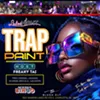
Trap & Paint + Music Bingo @ Blush CLT
-
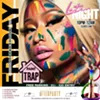
Trap & Paint (Hookah Edition) @ Blush CLT
-
The Mind of Matt Cosper
XOXO Steps Beyond the Threshold of Freaky Theater
-
A Many-Splendored Plaid
Plus, Evelyn Glennie's fascinating rhythms
-
Jezebel star has Bette Davis eyes, nothing else 3
Play follows custom of casting male in lead role

